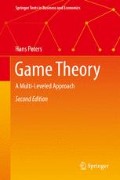Abstract
In this chapter we consider a few classes of games with transferable utility which are derived from specific economic (or political) models or combinatorial problems. In particular, we study assignment and permutation games, flow games, and voting games.
Access this chapter
Tax calculation will be finalised at checkout
Purchases are for personal use only
Notes
- 1.
Also called the Shapley-Shubik power index in this context.
References
Curiel, I. (1997). Cooperative game theory and applications: Cooperative games arising from combinatorial optimization problems. Boston: Kluwer Academic.
Curiel, I., Derks, J., & Tijs, S. H. (1986). On balanced games and games with committee control. Operations Research Spektrum, 11, 83–88.
Derks, J. (1987). Decomposition of games with non-empty core into veto-controlled simple games. Operations Research Spektrum, 9, 81–85.
Kalai, E., & Zemel, E. (1982). Totally balanced games and games of flow. Mathematics of Operations Research, 7, 476–478.
Nowak, A. S. (1997). On an axiomatization of the Banzhaf value without the additivity axiom. International Journal of Game Theory, 26, 137–141.
Shapley, L. S., & Shubik, M. (1972). The assignment game I: The core. International Journal of Game Theory 1, 111–130.
Tijs, S. H., Parthasarathy, T., Potters, J. A. M., & Rajendra Prasad, V. (1984). Permutation games: Another class of totally balanced games. Operations Research Spektrum, 6, 119–123.
Author information
Authors and Affiliations
Rights and permissions
Copyright information
© 2015 Springer-Verlag Berlin Heidelberg
About this chapter
Cite this chapter
Peters, H. (2015). Special Transferable Utility Games. In: Game Theory. Springer Texts in Business and Economics. Springer, Berlin, Heidelberg. https://doi.org/10.1007/978-3-662-46950-7_20
Download citation
DOI: https://doi.org/10.1007/978-3-662-46950-7_20
Publisher Name: Springer, Berlin, Heidelberg
Print ISBN: 978-3-662-46949-1
Online ISBN: 978-3-662-46950-7
eBook Packages: Business and EconomicsEconomics and Finance (R0)

